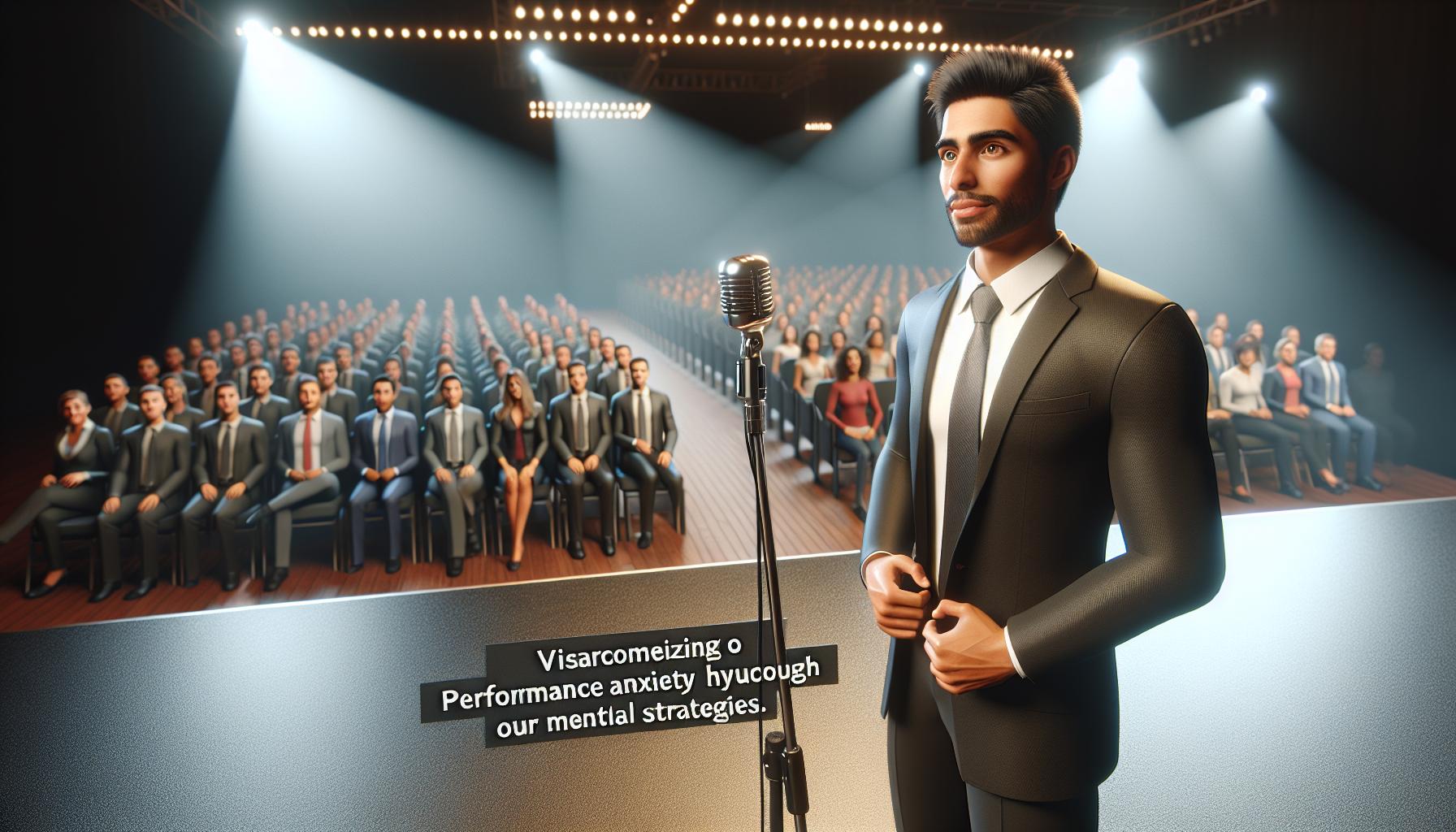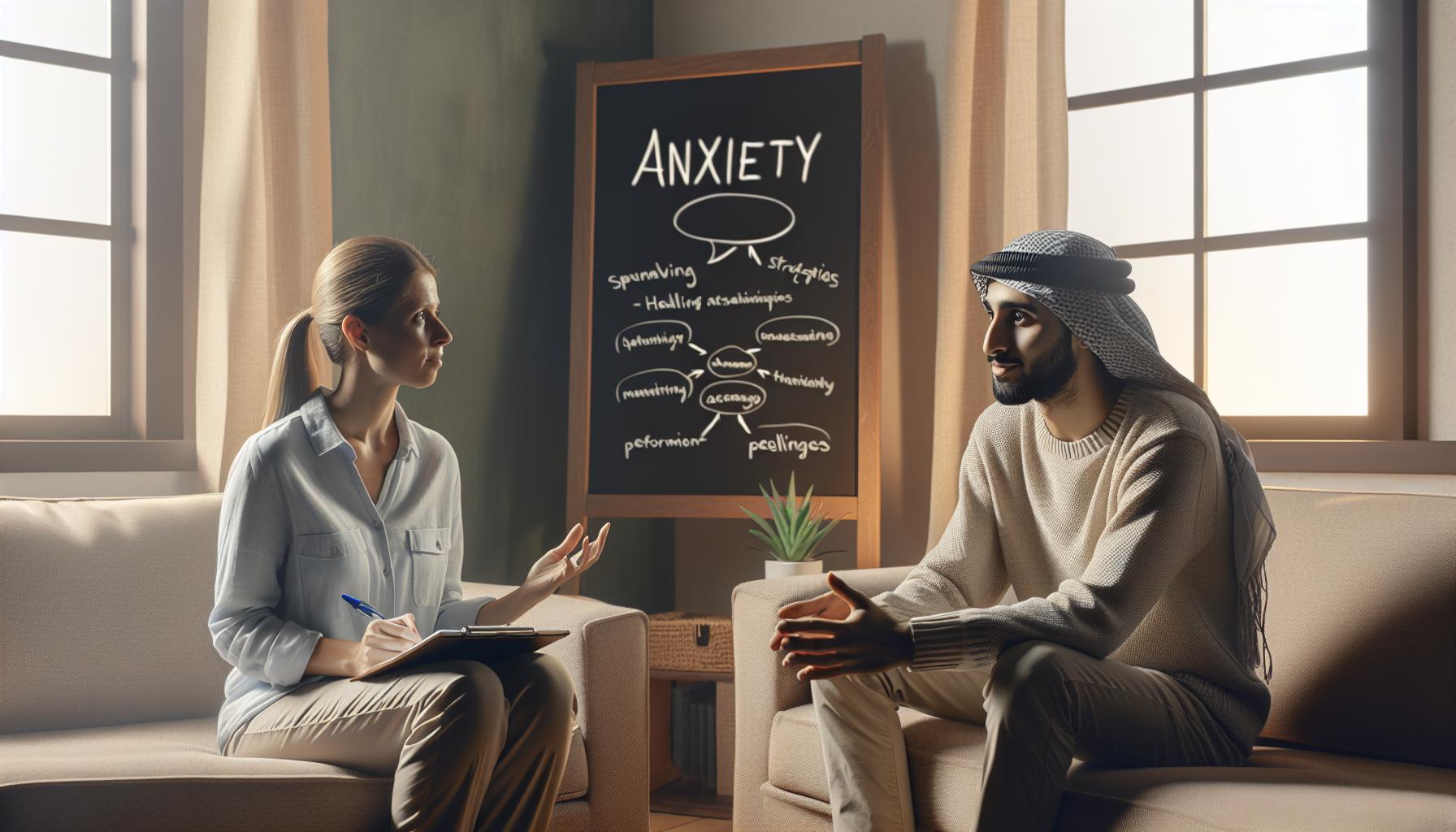We’ve all been there. The spotlight hits, palms start to sweat, and the heart races. It’s stage fright, a common experience that can cripple even the most seasoned performers. But don’t worry, I’m here to help you navigate this tricky territory.
Performance anxiety isn’t just for actors and musicians. It can strike anyone who steps into the spotlight. Whether you’re delivering a presentation at work or giving a toast at a wedding, stage fright can sneak up on you. But it’s not an insurmountable obstacle.
In this article, we’ll delve into the world of performance anxiety and explore practical strategies to overcome stage fright. You’ll learn about the root causes of this fear and how to conquer it. So, let’s dive in and turn those butterflies into a standing ovation.
Contents
Understanding Performance Anxiety
Now that we’ve established that stage fright is a common experience, it’s crucial to delve deeper and understand what performance anxiety truly is. The first thing to remember? It’s not a sign of weakness or incompetence. Quite the contrary, it’s usually a signal that you care about doing your best.
Performance anxiety, often referred to as stage fright, is essentially a type of stress that manifests during a live performance or presentation. While this condition is most often linked to actors and musicians, anyone who stands in the limelight can experience it. Your school presentation, a big job interview, or even a meeting with your boss can trigger the same stress response.
The body’s reaction to a perceived threat – the classic fight or flight response – plays a significant role in performance anxiety. Your heart might start pounding, your palms might get sweaty, and you might even feel like you can’t remember a single word you were going to say.
These physical symptoms are your body’s way of preparing you to either stay and fight the ‘danger’ or run away from it. It doesn’t realize the ‘danger’ is just a performance. Awareness of this fight or flight mechanism is crucial to managing stage fright.
Diving deeper into the root causes of stage fright, a fear of judgment often surfaces as a leading factor. It’s human nature to want to succeed and not make a fool of ourselves. The fear of failing, being judged, or not living up to expectations can feed performance anxiety.
Understanding the psychological aspects of stage fright is just as important for overcoming it. More on this in the next section: “Combatting Performance Anxiety: Practical Tips”.
The Root Causes of Stage Fright

When we look at stage fright, it’s important to understand that it’s often a symptom of deeper issues. One of the primary causes is performance standards. We set benchmarks for ourselves and when there’s a chance we may not meet these, we become anxious. High achievers and perfectionists are especially susceptible to this.
Another key cause is negative past experiences. If you’ve had an incident on stage where things didn’t go well, your brain becomes conditioned to associate stage performances with anxiety, leading to increased nerves every time thereafter.
Fear of the unknown also contributes significantly to performance anxiety. Uncertainty about what’s to come sets our mind racing, imagining every possible thing that can go wrong. This form of anxiety isn’t exclusive to stage performances, it’s an evolutionary trait meant to keep us safe from danger.
Societal pressure can exacerbate performance anxiety. The constant judgment we experience in society extends to the stage, adding another layer of perceived scrutiny and increasing the pressure to perform flawlessly.
Remember, it’s not just artists and musicians who experience stage fright. Giving presentations at work, talking in a gathering, making a toast at a diner – these are all forms of public speaking where performance anxiety can surface.
Anxiety triggers something in our bodies called the fight or flight response. It’s where your body perceives a threat (in this case, public embarrassment or failure) and prepares you either to stand ground and fight or to run away. Adrenaline is released, heart rate increases and the senses become heightened, which can result in symptoms such as shaky hands, a cracky voice, or sweaty palms.
In a nutshell, the root causes of stage fright are really a complex mix of individual standards, past experiences, fear of the unknown, societal pressure, and our body’s natural response to perceived danger.
Recognizing the Signs of Stage Fright

Now that we’ve explored what performance anxiety is and its common root causes, it’s time to delve into recognizing the signs of stage fright. After all, understanding when it’s happening to you is the first step to overcoming it.
Typically, stage fright manifests itself through various psychological, emotional, and physical symptoms. Some signs are quite evident, while others might sneak up on you unexpectedly. Here are some telltale signs to be aware of:
- Physical Signs: Sweating, shaking, dry mouth, rapid heart rate, nausea, and shortness of breath can all be symptoms.
- Emotional and Psychological Signs: Feelings of dread, panic or catastrophic thinking, intense worry about potential failure, fear of embarrassment.
Notice how almost all these signs are characteristics of the body’s fight-or-flight response since stage fright is fundamentally a response to perceived danger. Do remember, it’s entirely natural and happens to the best of us.
Being aware of these symptoms will help you develop more effective strategies to overcome performance anxiety.
Now let’s move on and discuss different strategies to combat these symptoms. Stay tuned for the next section, where we’ll delve into the myriad of techniques you can employ to keep stage fright at bay and deliver your best performance, every time.
Preparing for Success: Essential Techniques

Before diving into specific techniques, awareness should be our first step. By acknowledging the reality of performance anxiety we can begin to combat it effectively. It’s a normal experience most of us go through when stakes are high and expectations are pressing.
Visualizing Success often plays a pivotal role in overcoming stage fright. Picture yourself in your performance environment; imagine delivering a successful presentation or performance. Visualization activates the same neural pathways as actual performance—essentially encouraging “mental rehearsal” and reinforcing self-confidence.
Progressive Relaxation is another effective technique. This involves systematically tensing and then releasing different muscle groups in your body. Starting from your toes upwards is a helpful guide. This technique can lead to a deeper state of relaxation, reducing physical symptoms of anxiety.
Now let’s explore The Power of Breathing. We often overlook this automatic process, but controlled breathing can significantly reduce anxiety. During moments of panic, our breathing might become quick and shallow, triggering the body’s fight or flight response. To counter this, focussing on deep, slow and controlled breaths can induce a calming effect.
Preparation is key. Prepare thoroughly for your performance. Including:
- Understanding your material
- Practicing under similar conditions to the actual performance
- Seeking feedback from others
A well-prepared mind reduces the fear of the unknown, boosting confidence and decreasing anxiety levels.
Valuable practices like Positive Self-Talk may prove beneficial in managing anxiety symptoms. Replace negative thoughts with encouraging, constructive statements. Remember, you are your biggest cheerleader.
Inserting a Structured Routine before your performance can provide a sense of familiarity and reduce anxiety caused by unpredictability. Adhering to a personal ritual or routine can instill a sense of serenity, allowing for a calmer, more focused performance.
These techniques are important stepping stones towards conquering stage fright. The journey will differ for each individual, but with recognition, practice, and patience, it’s within your reach. Stick around and we’ll explore more about the world of performance anxiety further.
There’s always more to learn and understand. So, let’s delve deeper into the realm of Performance Anxiety.
Building Confidence Through Practice

Speaking of conquering stage fright, one can’t overestimate the power of practice. Nothing builds confidence better than knowing you’re well-prepared.
When you’re practicing, you’re simulating the event and making it familiar. The more acquainted you are with a scenario and your material, the less foreign and daunting it feels. This directly reduces the fear of the unknown, one of the fundamental triggers of performance anxiety.
Practice is not simply repeating the same steps over and over. It’s evaluating each attempt, identifying areas of improvement, and implementing changes in the next go-around. This process of continuous improvement helps build resilience and confidence.
Let’s dive into a few ways you can structure your practice to maximize its effectiveness in mitigating performance anxiety:
Deliberate Practice
This technique involves breaking your performance down into parts and working on each one separately. Whether it’s practicing a speech, a musical performance, or an important presentation, deliberate practice allows you to work methodically and systematically. You’ll focus on mastering one aspect before moving onto the next.
Stage Simulation
Creating a similar environment to the one you’ll be performing in can be beneficial. This could mean practicing in front of friends or family, or even recording yourself. With time, the stage will soon feel like second nature and significantly lower the anxiety levels at the time of real performance.
Regular Mock Performances
Another great way to get familiar with the scenario is by doing regular mock performances. This allows you to realize how you’re likely to behave during the real situation and plan tackling potential obstacles.
Remember, stage fright isn’t necessarily resolved overnight. It’s a journey of understanding your anxiety, working through your fears, and building resilience. Utilize practice as a tool to work towards conquering stage fright. Practicing to perfection not only provides assurance that you’re well-prepared but also reinforces the idea that you’re capable, and you can handle the performance.
Mental Strategies to Overcome Stage Fright

Moving on from the topic of physical preparation, let’s step into the territory of mental strategies. This area deserves an equal — if not more — emphasis as it’s often our mind that fuels anxiety.
Learning to manage internal dialogue is foundational to overcoming performance anxiety. Are you constantly telling yourself that you’re not good enough? That you’re destined to fail? It’s time you turned those thoughts around. Reinvent your self-talk. Instead of harping on negatives, focus on your abilities. Positive affirmations can provide a significant confidence boost.
Say them aloud when you’re practicing. Use them to drown out the uncertainties. Claim statements like, “I am capable,” “I can handle this,” or “I’m going to give my best” can work wonders on your mindset.
Another useful approach toward mitigating stage fright is cognitive restructuring. This technique encourages you to identify and challenge irrational fears. Fear like, “If I make a mistake, it’ll be disastrous.” More often than not, the reality is not as bad as our minds make it out to be. Understanding this difference between perceived fear and actual implications can help reduce anxiety.
Alongside these methods, visualization plays a significant role as well in easing performance anxiety. Picturing yourself as successful builds a mental image of the desired outcome, boosting your confidence.
Let’s quickly summarize these points in a table for easy reference.
| Mental Strategies | Description |
|---|---|
| Positive Affirmations | Turn around negative self-talk, focus on abilities. |
| Cognitive Restructuring | Identify and challenge irrational fears. |
| Visualization | Picture yourself successful, build a mental image of the desired outcome. |
Remember, adopting these mental strategies for stage fright often requires time and persistence. You can’t expect overnight transformation, but rest assured, with consistent practice, you will notice a definite shift in your confidence and overall performance. Your journey to overcoming stage fright starts within, let’s further explore different facets of this journey.
Physical Techniques to Reduce Anxiety
After understanding the importance of mental strategies in overcoming stage fright, it’s equally crucial to acknowledge the role of physical techniques in reducing anxiety. The mind-body connection is powerful, and what we do physically can have a significant impact on our mental state.
One physical technique that’s proven effective is progressive muscle relaxation (PMR). It involves tensing, then relaxing each muscle group in the body. This process helps to alleviate physical tension, making one feel more relaxed and in control. When I first started utilizing PMR, I noticed significant changes not just in my stage performances, but also in everyday stressful situations.
Another technique to consider is controlled breathing exercises. These help slow the heart rate and stabilize the body’s fight or flight response, reducing the physical symptoms of anxiety. Remember, when we’re nervous, our breathing often becomes fast and shallow, which can exacerbate feelings of panic and fear. Controlled breathing exercises involve inhaling slowly for a count of four, holding for a count of four, then releasing for a count of four. They’ve worked wonders for me and for thousands of individuals dealing with performance anxiety.
A third technique worth exploring is regular physical exercise. Regular exercise is vital in maintaining general health and wellbeing, and it’s especially beneficial for reducing anxiety. It aids in relieving stress, improving mood, and boosting confidence, all of which are crucial in managing performance anxiety. My personal favorite physical exercise is running, but you can choose any form of exercise that suits you – whether it’s yoga, dancing, swimming, or weightlifting.
To optimize the advantages of these physical techniques, practice them regularly and combine them with your mental strategies. This balanced approach will ensure that you’re tackling performance anxiety from all angles.
The Power of Positive Visualization
After you’ve established a routine of physical relaxation techniques, it’s time to add another tool to your anxiety-fighting toolkit: positive visualization. This mental technique utilizes the power of the mind to create a favorable outcome in a given situation. It’s proven to be a powerful practice that not only athletes use to enhance their performance, but also performers and public speakers to overcome stage fright.
The science behind positive visualization is fascinating and, believe it or not, it all comes down to frequency. Our brains operate on specific wavelengths: Beta waves when we’re alert, Alpha waves when we’re relaxed, and Theta waves during the stages of sleep. By visualizing success, we can actually change the frequency of our brain waves and align them with a state of confident anticipation.
Here’s how you can start harnessing the power of positive visualization:
- Find a Quiet and Comfortable Place
- Visualize Your Performance
- Associate Positive Emotions
Remember, visualization isn’t just about seeing the outcome you want – it’s about feeling it deep in your core. Practice visualization regularly, along with controlled breathing exercises and PMR. It’ll take some time, but with patience and consistency, you’ll notice a significant decrease in your performance anxiety.
Seeking Professional Help

There are instances when you’ve tried every trick in the book, but your stage fright anxiety seems to have a mind of its own. This can happen, and it doesn’t mean you’re less talented or capable than others – it simply means you might need to enlist additional support to tame that stage beast. Professional help can provide invaluable assistance in identifying strategies that work best for you.
Psychologists and therapists can play a constructive role in treating performance anxiety. With their expertise, they probe into the origin and dynamics of your particular anxiety, endeavouring to offer insight and practical techniques for mitigating your fears. They deploy tailored approaches, ranging from cognitive behavioural therapy (CBT) to mindfulness techniques, aimed at rewiring your mind’s response to anxiety-inducing situations.
However, it’s crucial to choose a therapist who specializes in overcoming performance anxiety, so there’s a solid understanding of the unique issues performers face. The right professional can make a marked difference in your battle against stage fright.
Support groups, another form of professional assistance, offer a compassionate community. Here, you can vocalize your struggles without judgment. The common knowledge that everyone in the group is grappling with similar issues can be a comforting reassurance. It’s a space where you can share experiences, learn from others, and gain exposure to various perspectives on handling performance anxiety.
While professional assistance can entail a financial investment, it’s important to consider the potential benefits. Often, the cost of leaving unchecked anxiety can outweigh the expense of seeking help. By tackling performance anxiety head-on with the right support, you’re not only investing in your career but also in your personal well-being.
So, if stage fright seems to have you in its grip, unable to shake it – don’t hesitate to seek professional help. This might just be a direction worth taking, leading to breakthroughs you’ve long yearned for. Trusting in the power of professional help could be your strategic edge to finally owning that stage.
Conclusion
So we’ve journeyed through the ins and outs of performance anxiety. It’s clear that stage fright isn’t a flaw but a sign you’re passionate about delivering your best. Remember, it’s not exclusive to the stage and can sneak up in various scenarios. Our bodies naturally react to perceived threats, often triggering this anxiety. Fear of judgment, high standards, past failures, the unknown, and societal pressures are common culprits behind stage fright.
Professional help can be a game-changer in managing performance anxiety. Psychologists and therapists equipped with the right skills can help you devise effective coping strategies. While it may require a financial commitment, the long-term benefits for your career and personal life are undeniable. Support groups also offer a safe space to share experiences and gain insights.
It’s time to take control of your stage fright. With the right approach, you can transform your performance anxiety into a driving force for success.
